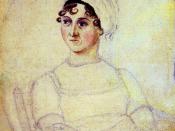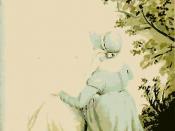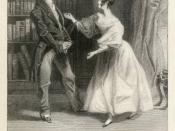Jane Austen was extremely modest about her genius, describing her work to her work to her nephew Edward as
"That little but (two inches wide) of ivory in which I work with so fine a brush as produces little effect after much labour."
Although the world of her novel "Pride and Prejudice" is confined to a small section of society comprising of country-gentry and lesser aristocracy of England in the opening of the 19th century, the novel itself shows page by page how interesting life could be, how fascinating life's twists and turns are, how significant the trivialities are to those concerned.
The range of Austen's novel is limited by her own circumstances, her own sex, and her position in the society. But the little world she writes about, she knows inside out. She fills her little world so artfully that when we are in it we do not long for anything else and we feel its fullness as well.
She practiced what she preached.
"There are four families in a country village" is the very thing to work on. She sticks to what she knows and is refusing to include in her novel what does not properly belong to village life; she is an artist.
Austen has an acute interest in personalities, her field is the human heart. Therefore, although she writes in the years of war between England and France while Napoleon was changing the map of Europe, in her novel we find not mention of "Britain at war." In "Pride and Prejudice" soldiers like Wickham, come to Meryton to provide, in a sense, amusement for the girls. Austen thus does not impose anything harsh or unnecessary on her novel; this alludes to the artistic unity of her creation. She consciously limits herself and does not write anything...


